|
|
|
Sort Order |
|
|
|
Items / Page
|
|
|
|
|
|
|
| Srl | Item |
| 1 |
ID:
079237
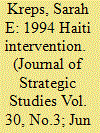

|
|
|
|
|
| Publication |
2007.
|
| Summary/Abstract |
Observers of United States (US) interventions have almost universally characterized the 1994 Haiti intervention as multilateral, a model for how international cooperation can achieve common security goals. A closer analysis of the intervention reveals that the planning and execution of the intervention were almost entirely unilateral and therefore cost the US few if any of the theoretical costs of coalition warfare, including interoperability and policy compromise. Mapped onto the unilateral strategy and operation of the intervention, however, was a multilateral diplomatic effort that secured United Nations Security Council authorization and provided a cover for an intervention that the US had already planned and intended to execute with or without that authorization. That the US sought a multilateral cover for an intervention that it could easily accomplish unilaterally shows the importance of two factors: A domestic audience that opposed unilateral peacekeeping but would accept using US resources as part of a broader multilateral operation, and a local population that would be more responsive to a multilateral coalition than a use of force that was perceived to be unilateral. The Haiti intervention shows that the determinants of success in operations other than war are as much political as military. When the US already has overwhelming military superiority vis-à-vis its adversary, building military coalitions becomes as much about enlisting political support as aggregating material capability.
|
|
|
|
|
|
|
|
|
|
|
|
|
|
|
|
| 2 |
ID:
079200
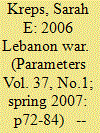

|
|
|
| 3 |
ID:
095638


|
|
|
|
|
| Publication |
2010.
|
| Summary/Abstract |
This article evaluates state-sponsored terrorism as a principal-agent issue. More often applied to the study of licit national or international institutions as a way to improve their governance, we argue that applying principal-agent analysis to illicit relationships such as those between states and terrorist agents is an equally fruitful application, though one with different objectives. Rather than being used as a tool to improve governance, applying principal-agent analysis to illicit relationships such as state-sponsored terrorism may point to areas of susceptibility and thus inform more effective counterterrorism strategies. In this article, we explain why states delegate to terrorist groups, how they seek to control their agents, and the tensions in the relationship, both generally and through specific reference to Iran's sponsorship of Hizballah, Syria of various Palestinian groups, and the Taliban of al-Qa'ida. This analysis yields propositions about the conditions under which states are likely to delegate to terrorist groups and specific recommendations on how principal-agent problems of these illicit relationships may be used in practice to combat terrorism.
|
|
|
|
|
|
|
|
|
|
|
|
|
|
|
|
| 4 |
ID:
104330
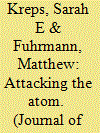

|
|
|
|
|
| Publication |
2011.
|
| Summary/Abstract |
What are the consequences of military strikes against nuclear facilities? In particular, do they 'work' by delaying the target states ability to build the bomb? This article addresses these questions by conducting an analysis of 16 attacks against nuclear facilities from 1942 to 2007. We analyze strikes that occurred during peacetime and raids that took place in the context of an ongoing interstate war. The findings indicate that strikes are neither as uniformly fruitless as the skeptics would suggest, nor as productive as advocates have claimed. There is evidence that the peacetime attacks delayed the target's nuclear program, although the size of this effect is rather modest. The wartime cases were less successful, as attacks often missed their targets either due to operational failure or limited intelligence on the location of critical targets. In our concluding section we show that many of the conditions that were conducive to past success are not present in the contemporary Iran case. Overall, our findings reveal an interesting paradox. The historical cases that have successfully delayed proliferation are those when the attacking state struck well before a nuclear threat was imminent. Yet, this also happens to be when strikes are the least legitimate under international law, meaning that attacking under these conditions is most likely to elicit international censure.
|
|
|
|
|
|
|
|
|
|
|
|
|
|
|
|
| 5 |
ID:
158850


|
|
|
|
|
| Summary/Abstract |
The question of international cooperation on nuclear security presents states with a conundrum. While states are wary of the potential for cheating and opportunism that would favor more legalized agreements, highly legalized agreements also create the risk of being constrained in an agreement with which others might not comply, leaving one state vulnerable. How do states balance these competing incentives? Through the study of all arms control agreements concluded, negotiated, and seriously considered since 1945, this analysis finds that at least some aspects of the legalization parameters that would make commitments more credible and sustainable through the future—in particular obligation and to a lesser extent delegation—also make bargaining over the terms of cooperation more difficult, sometimes delaying if not altogether subverting that process. These findings have implications not just for how theories of institutional design and cooperation apply to nuclear issues but also for policies related to the conduct of arms control negotiations.
|
|
|
|
|
|
|
|
|
|
|
|
|
|
|
|
| 6 |
ID:
148482
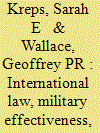

|
|
|
|
|
| Summary/Abstract |
Despite the increased emphasis on domestic politics in the study of international law, scholars remain divided about whether and how international law affects domestic institutions. Moreover, while public support is a core ingredient for sustainable, legitimate policies in a democracy, research at the individual level of analysis remains limited. Weighing in on these areas of study, we investigate the use of drone strikes for counterterrorism, a subject of considerable debate. Proponents in the government point to drones as both effective for disrupting terrorist networks and compatible with international law. Critics from groups such as international organizations (IOs) and nongovernmental organizations (NGOs) respond that attacks create more terrorists than they kill and violate legal commitments. The central question we ask in this article is whether these international legal criticisms impact public support for drone strikes, the centerpiece of US counterterrorism policy, or whether individuals are more persuaded by effectiveness-based arguments. Employing a survey experiment of a nationally representative sample of the United States, we find IO and NGO criticisms can shape public attitudes even around an important national security issue like drone strikes, but are most influential when messages center on legal critiques rather than matters of effectiveness. Our findings speak to fundamental questions about the domestic politics of international legal commitments, the role of IOs and NGOs in shaping political debates, and the durability of US counterterrorism policy.
|
|
|
|
|
|
|
|
|
|
|
|
|
|
|
|
| 7 |
ID:
127836
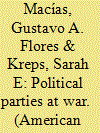

|
|
|
|
|
| Publication |
2013.
|
| Summary/Abstract |
What determines when states adopt war taxes to finance the cost of conflict? We address this question with a study of war taxes in the United States between 1789 and 2010. Using logit estimation of the determinants of war taxes, an analysis of roll-call votes on war tax legislation, and a historical case study of the Civil War, we provide evidence that partisan fiscal differences account for whether the United States finances its conflicts through war taxes or opts for alternatives such as borrowing or expanding the money supply. Because the fiscal policies implemented to raise the revenues for war have considerable and often enduring redistributive impacts, war finance-in particular, war taxation-becomes a high-stakes political opportunity to advance the fiscal interests of core constituencies. Insofar as the alternatives to taxation shroud the actual costs of war, the findings have important implications for democratic accountability and the conduct of conflict.
|
|
|
|
|
|
|
|
|
|
|
|
|
|
|
|
| 8 |
ID:
161965
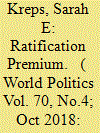

|
|
|
|
|
| Summary/Abstract |
This article examines the effect of leaders’ foreign policy preferences on their ability to pursue and ratify arms control agreements. Does it take a “Nixon to go to China,” with hawks more effective than doves, when it comes to the domestic politics of treaty ratification? The authors observe that the theoretical logic correctly identifies an asymmetry between hawkish and dovish presidents, with the latter facing a credibility gap in advocating arms reductions. Although existing accounts assume leaders are captives of their type, the authors argue that dovish executives can overcome their credibility gap by obtaining the endorsement of informed legislators. These executives do so by paying a ratification premium, usually in the form of increased defense effort in areas not covered by the treaty. As a result, doves do not necessarily face a lower rate of success at the ratification stage; their disadvantage manifests itself primarily in the higher premium needed to obtain the same level of support as hawkish executives. The article demonstrates this argument through a formal model and tests the implications with paired comparisons of major arms control treaties in the Cold War and post–Cold War periods. The argument helps to resolve the Nixon-to-China theoretical debate. It shows that dovish leaders are not necessarily captives of their type because they can deploy side payments to achieve their policy goals. It also explains important puzzling features of the arms control record.
|
|
|
|
|
|
|
|
|
|
|
|
|
|
|
|
| 9 |
ID:
149251
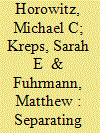

|
|
|
|
|
| Summary/Abstract |
What are the consequences of drone proliferation for international security? Despite extensive discussions in the policy world concerning drone strikes for counterterrorism purposes, myths about the capabilities and implications of current-generation drones often outstrip reality. Understanding the impact of drones requires separating fact from fiction by examining their effects in six different contexts—counterterrorism, interstate conflict, crisis onset and deterrence, coercive diplomacy, domestic control and repression, and use by nonstate actors for the purposes of terrorism. Although current-generation drones introduce some unique capabilities into conflicts, they are unlikely to produce the dire consequences that some analysts fear. In particular, drone proliferation carries potentially significant consequences for counterterrorism operations and domestic control in authoritarian regimes. Drones could also enhance monitoring in disputed territories, potentially leading to greater stability. Given their technical limitations, however, current-generation drones are unlikely to have a large impact on interstate warfare. Assessing the consequences of drone proliferation has important implications for a range of policy issues, including the management of regional disputes, the regulation of drone exports, and defense against potential terrorist attacks on the homeland.
|
|
|
|
|
|
|
|
|
|
|
|
|
|
|
|
| 10 |
ID:
084061
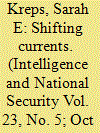

|
|
|
|
|
| Publication |
2008.
|
| Summary/Abstract |
Lost in the political fallout of the Iran National Intelligence Estimate (NIE) of 2007 was any discussion about historical parallels and what those might say about intersection between intelligence, policy, and politics. This article argues that the NIEs on the ballistic missile threat of the 1990s offer a useful analogy. In a short period of time, the NIE's assessment of the threat from so-called 'rogue states' went from modest to non-existent, provoking charges of politicization, eliciting investigations, and pausing the US missile defense program. A similar sequence of events followed the NIEs on Iran, whose tenor appeared to shift from alarmist in 2005 to dismissive in 2007. If the experience of the ballistic missile NIEs is any guide, then it is not clear that the 'cure'- investigations and commissions - are better than the disease. Both cases illustrate the need for the intelligence community to remain detached but not unaware of the policy environment into which these estimates are introduced. They also reaffirm that estimates are just estimates, probabilistic rather than deterministic judgments about future events.
|
|
|
|
|
|
|
|
|
|
|
|
|
|
|
|
|
|
|
|
|